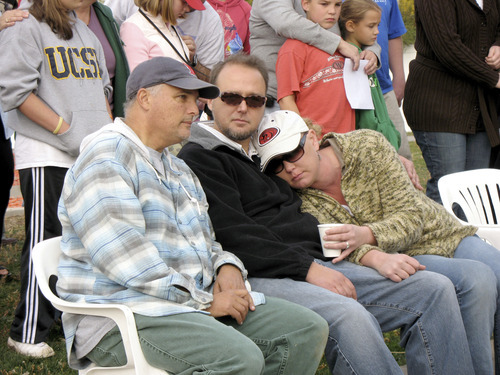This is an archived article that was published on sltrib.com in 2011, and information in the article may be outdated. It is provided only for personal research purposes and may not be reprinted.
A federal judge on Tuesday awarded $1.95 million to the family of a young boy killed in a 2007 bear attack.
Samuel Ives, 11, was camping in American Fork Canyon with his mother, step-father and brother when he was ripped from his family's tent and killed by a black bear on the night of June 17, 2007.
In his ruling, U.S. District Judge Dale Kimball said the U.S. Forest Service was required to warn the family that a dangerous animal was on the loose in canyon after reports that a bear had opened coolers and slashed through a tent in the area earlier that day.
Ives' family "proved by a preponderance of evidence" that the Forest Service owed them a duty "to warn them about the earlier incident, whether the warning was oral, by posting signs on the gate of Timpooneke Road 56, and/or by roping off the specific campsite," Kimball wrote.
The boy's grandmother, Sharon Ives, said Tuesday that her family was "thrilled" with the ruling and happy to put the lawsuit behind them.
"It's hard enough to lose somebody in a violent manner," she said, "but to have to keep going through it and reliving it — it's a nightmare."
Sharon Ives said Sam's parents filed the lawsuit "to prevent this from happening to anybody else."
"Sam was always concerned about everybody else and we thought he would want this," she said. "Money doesn't bring him back. We think about him every day."
The United States, meanwhile, could still appeal the judgment.
"We are reviewing the decision and will consult with the Department of Justice as we weigh our options going forward," Melodie Rydalch, spokeswoman for the U.S. Attorney's Office, said in an email Tuesday evening.
Throughout the case, attorneys for the Forest Service said the government agency was immune from litigation and that it's impossible to prove any action taken by the agency would have changed the outcome of the bear attack.
In court, defense attorneys said the Forest Service did not need to warn of a black bear threat because there had never been a fatal attack by a black bear before in Utah.
Nevertheless, Kimball found the agency negligent in warning of the danger.
Earlier in the day, a camper in the area called the Utah Highway Patrol and the Forest Service to report the earlier bear sighting. UHP officials alerted the Division of Wildlife Resources, which began searching for the bear, deeming it necessary to kill the animal.
The Forest Service employee who spoke with the camper, however, failed to take action and did not notify anyone else of the sighting.
Ives' family intended to spend the night in the Timpooneke campground, but did not have the $13 for the fee. Instead, they asked if they could camp up the road without paying. The Forest Service employee who spoke with Ives' family about the campground fee said in court that he would have notified the family of the danger if he had been aware of it.
That night, Samuel Ives was killed. His body was found about 400 yards away from his family's tent.
The bear was found and killed the next day.
Kimball said the Ives family could have been entitled to as much as $3 million. But a judgment of $1.95 million was awarded because Kimball found the Forest Service to be 65 percent responsible.
The remainder of the liability fell on the DWR for not alerting the Forest Service of its search for a bear it deemed necessary to kill and Ives' family for having food in the campground.
A granola bar wrapper and an open Coke Zero can were inside the tent.



